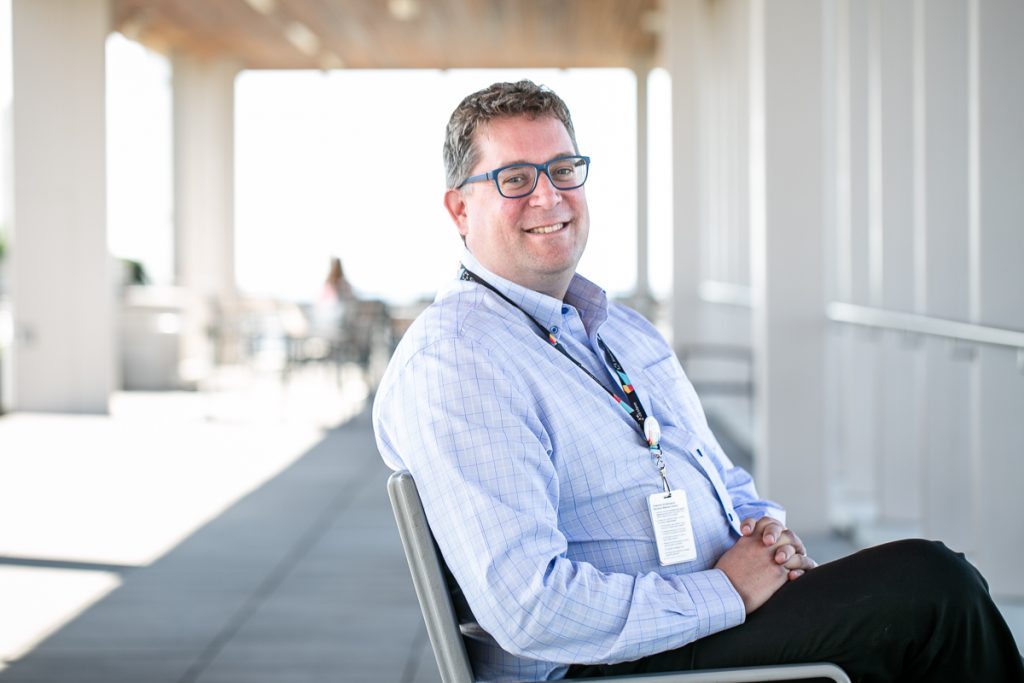 Meet Dr. Mark Lachmann, the Medical Lead of Sinai Health’s Bridgepoint campus. Mark is a geriatric psychiatrist working with patients in acute, rehabilitation, long-term care, and community settings. He also works as a Coroner and sits on the Geriatric and Long Term Care Death Review Committee of the Coroner’s Office. Mark has also recently been appointed Chair of the Board of Directors of Casey House, Canada’s only stand-alone hospital for people with HIV/AIDS.
Meet Dr. Mark Lachmann, the Medical Lead of Sinai Health’s Bridgepoint campus. Mark is a geriatric psychiatrist working with patients in acute, rehabilitation, long-term care, and community settings. He also works as a Coroner and sits on the Geriatric and Long Term Care Death Review Committee of the Coroner’s Office. Mark has also recently been appointed Chair of the Board of Directors of Casey House, Canada’s only stand-alone hospital for people with HIV/AIDS.
Can you tell us a little bit about the path that led to your career in psychiatry?
I have always been interested in people and how we make our way through the world. I started out as a family physician, working in Moose Factory for seven years on James Bay in Northern Ontario, then for 3 years in Iqaluit on Baffin Island in Nunavut. The work in Cree and Inuit communities really brought me into psychiatry. I find that psychiatry brings together medical, social, psychological perspectives to help support patients and families. I also enjoy the collaborative work in teams that is an intrinsic part of my current practice in geriatric psychiatry.
You have a lot of different hats that you wear, including working in remote northern communities, serving as a coroner here in Toronto and now as the chair for the board of Casey House. Can you tell us a little bit about what your day/week / routine looks like and how you fit everything in?
I don’t do the remote work that I used to any more, however I do help support a wonderful senior’s mental health team in Sault St. Marie by travelling there for three week-long trips a year, then doing regular OTN Telehealth visits as well. I really enjoy the diversity of my professional work, with most hospital and administrative work in the mornings and clinic and community outreach in the afternoons. I also don’t work alone, and work with teams of people assessing and supporting the frail elderly in different contexts. I find the different settings really help me understand patients as they try to access care. The coroner work is important to me as a reminder that we have a long way to go to ensure access to health care for all. Casey House, a specialist HIV hospital, has been a beacon of hope for our community now for decades, and it is energizing to be able to contribute however I can.
How do you approach work-life balance? Any particular hobbies, sports, travel?
I really value time with my partner and family. My work regularly reinforces how valuable these relationships are, so we have to prioritize them. Because my days are so intensely social, I tend to spend private time in quieter ways. I love to read (everything), swim, listen to music (jazz, Motown, Nina Simone, classical), and I also love the ocean. I am originally from Vancouver, and have spent much time in Pacific Rim National Park on the West Coast of Vancouver Island. I like wild out-of-the-way natural places.
Do you have any mentors or people you look up to who have influenced your career or your life and helped you along the way?
I was very much influenced by the Cree communities I worked with on James Bay. I was a young family doctor at the time and found I learned so much from living in Moose Factory. The stories and experiences shared from elders in the community brought me to my eventual geriatric psychiatry practice. The communities themselves taught me about the value of relationships, family, compassion, and forgiveness. I also tried to learn patience, but am very much still working on that. The northern practice both on James Bay and Baffin Island changed my perspective completely on relating to the world and I feel very privileged for having had that experience.
Tell us about something on your “bucket list” that you’re planning on doing or working towards accomplishing?
I very much like traditional Japanese gardens. We are planning a trip to Japan over the next couple of years, and will be excited to do a tour of some of the famous gardens there.
If you could have dinner with any person, who would it be and why?
For dinner, I would like to have two guests – James Joyce and Oscar Wilde, both celebrated Irish writers who just had such a keen and complex view of human nature that I think supper would be fascinating. I also am not sure they would get along so that would make the meal even more interesting.
